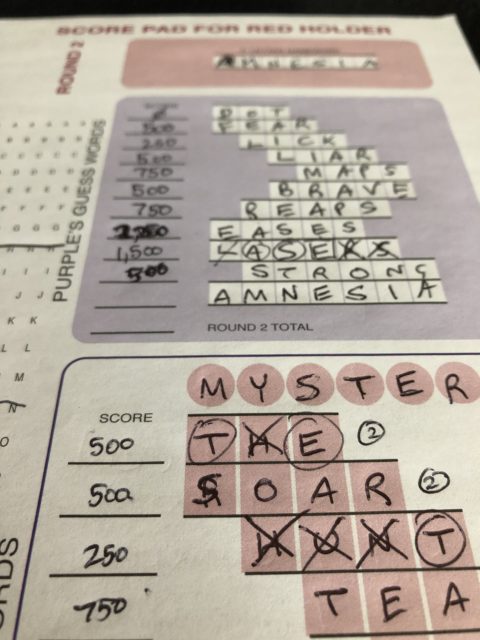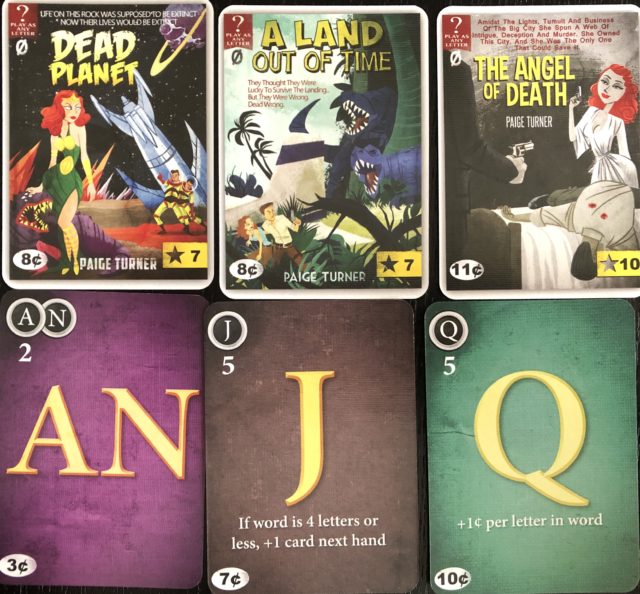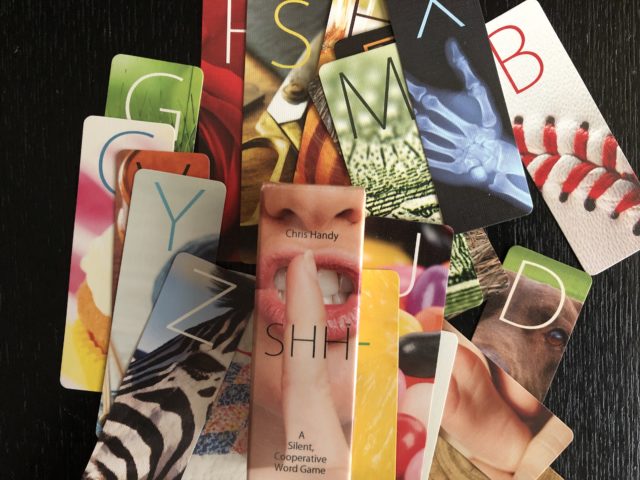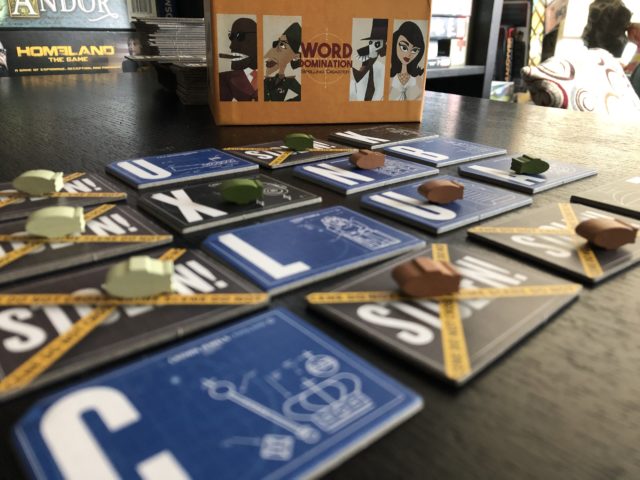A couple of weeks ago I included Scrabble as one of the three “marquee games” of the tabletop world. Like Monopoly and Risk, it epitomizes the concept of “board game” in most people’s eyes. I grew up loving and playing tons of Scrabble and Boggle, mainly with my mother—who still loves to play them. So they occupy a special place in my heart.
On BGG, the Word Games category includes many games like Codenames which definitely feature words as a central mechanic…and yet I personally would not call them word games.
To me word games are about letter manipulation; in other words, the challenge of creating or changing words from individual tiles, cards, or dice. The earliest “word game” in the BGG database is Karuta, a Japanese card game from the 1600’s–but it is basically a variation of the classic Concentration memory game which has been around forever. The next earliest word game, however, is Ortho, from 1783, and it’s definitely a letter manipulator. It consists of a deck made up of letter cards, each of which has been given “certain powers”; players form words with the cards, with an emphasis on “correction in spelling”. By 1899 you had Letters and Anagrams, published by none other than Parker Brothers, with letters on individual tiles which were drawn randomly trying to create words.
Scrabble came along fifty years later, in 1948, and from the start proved so popular that it sucked almost all the oxygen out of the genre to the exclusion of all else. Probe, from 1964, did pretty well, but it wasn’t until Boggle arrived in 1972 that Scrabble had any competition. And although Boggle remains very popular today it doesn’t have its own dictionary, annual Official Tournament, or even a very good app.
Then in 2006 Bananagrams arrived on the scene. The game had been around (as Pick Two) since the early 90s, but it took some streamlining of rules and scoring–and a unique zipper carrying case–to give it the visibility and cachet it needed to carve its own niche.
Today word games tend to get short shrift by modern tabletoppers. I think there are several reasons for this. The first is the ongoing de-emphasis on spelling norms in education (yes, I know that’s a generalization) and pop culture itself (texting, social media, etc.). Scrabble has itself contributed to this de-emphasis by including more and more words in its official dictionary, to the point that it seems like almost any two-letter combo is now legal–how different from the days of my youth! But in a world where spelling doesn’t matter so much, word games lose their lustre. You need some agreed-upon spellings to keep the playing field level and provide a challenge—don’t you? (Not a rhetorical question. What do you think?)
The second, more prosaic reason from a design point of view is the difficulty in making word games “sexy” looking on the table, to compete with the Rising Suns and Wingspans out there. The classic Scrabble board is about as bland as you can get. Tiles and cards on their own can only provide so much eye-candy. And the troika of Scrabble, Boggle, and Bananagrams are so popular that anyone shopping for a word game has very little incentive to look any further.
And yet here I am with five suggestions for “letter manipulation games” that deserve your attention. Each of them puts a unique twist on the genre and rewards budding philologists with good gameplay. Here they are in chronological order:

What’s My Word (1972): I remember playing this as a kid and then wondering whatever happened to it. Then in 2010 Gryphon Games re-released it and I was ecstatic to rediscover it. What’s My Word is a two-player game like Mastermind but with words instead of coloured pegs. Each player thinks of a secret six- or seven- letter word and take turns guessing, with guesses accruing points depending on their accuracy. The cool thing is that your guesses have to be words, too, and at first can only be three or four letters long, and the response from your opponent is ambiguous enough that you really have to think through various possibilities. The game rewards logical thinking as much or more than knowing obscure words. Totally portable, playable on an airplane or in line at the store, What’s My Word is a great find. It’s creator clearly had a knack for two-player games, as he also designed Bridgette, a brilliant two-player version of Bridge, and Solitaire for Two, which does the same thing for Klondike.

Paperback (2014)/Hardback (2018): Both are deckbuilding games by Tim Fowers and with the same graphic sensibility of his excellent co-op game Burgle Brothers. Fowers hits all the right notes (typewriter keys) here, with lots of wild cards and special abilities on cards to make words easy to construct–but making long and high-scoring words is more of a challenge, which is just as it should be. I think Hardback is a better game because it adds “faction abilities” which encourages buying cards of the same “font” for their synergies, as well as ways to push your luck and increase hand size. If you’re looking for a game for your Scrabble-loving friend to introduce them to deckbuilding and tabletop in general, these are great choices. There are also apps for both games available for iOS and Android (very unchallenging AI, unfortunately).

SSH (2015) is one of the games in Chris Handy’s first “Chewing Gum Games” set: games that come in Juicy-Fruit-sized boxes that provide excellent bang for your buck. SSH is neat because it’s a co-operative variation of the classic game of Ghost: two to four players are dealt a hand of cards from a deck consisting of the alphabet (minus the vowels, which sit on the table available to all). The aim is to use up all the cards by spelling words one letter at a time. But the catch is there is no talking allowed (hence the name SSH). It’s quite a hard game to win, particularly with just two players. But the randomness of the initial deal, and the fact you can only use each letter once, make for a great challenge.
Letter Tycoon (2015) adds a layer of simple economic rules to spice things up. Each player has a hand of letter cards, and there are three Community cards in the middle. On your turn you play a word–the longer the better–to earn money and stock (the latter not spendable but earning VP at end of game. Then you can take out a “patent” on one of the letters you used that turn. From then on, whenever someone uses that letter, they must pay you a buck. The most common letters require the most money up front (“E” costs $10, for example) but theoretically earn you the most in the long run (of course, other players will try to avoid using patented letters where possible). Some of the more obscure letters give you pretty awesome powers if you patent them, so in those cases you’re investing for the power rather than income. All in all Letter Tycoon is a neat hybrid game that encourages out-of-the-box word construction.

Word Domination (2017), like Letter Tycoon above, adds another mechanic (in this case, simple area-control) to make gameplay more interesting. Each player is a supervillain attempting to dominate the grid of letter tiles, some of which have special abilities. It takes two turns to lock down a tile–it can be stolen from you in the interim. And endgame scoring is based on having stolen contiguous groups of tiles so knowing the longest and most obscure words doesn’t automatically translate into victory. This separates Word Domination from the rest of the word game pack. With advanced rules each villain has special powers, and co-operative and solo modes are also included. Designer Jeff Beck (no, not that Jeff Beck) deserves plaudits for this unique design.
Also Spell Smashers! I heard that one was pretty good too! 🙂 – CC
It is! In fact, we have a review of it coming up!